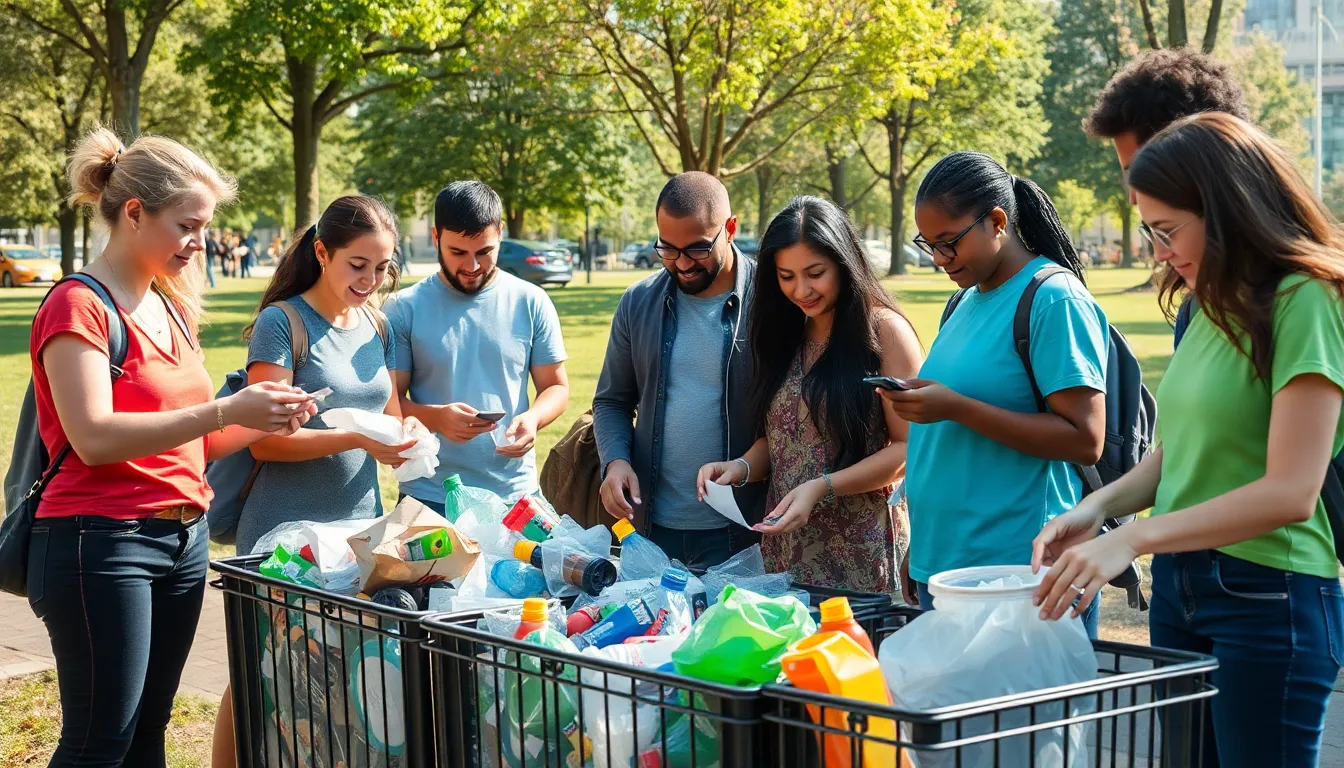In a world where plastic seems to multiply faster than rabbits and climate change feels like that persistent relative who just won’t leave, sustainable living has never been more crucial. It’s not just a trend; it’s a lifestyle shift that’s as necessary as remembering to water your plants (sorry, cactus).
Imagine a life where your choices not only benefit your wallet but also the planet. From eco-friendly swaps to energy-saving hacks, this sustainable living guide is packed with practical tips that’ll have you feeling like a superhero—cape optional. Join the movement and discover how simple changes can lead to a greener, happier life. After all, who wouldn’t want to save the world while sipping organic, fair-trade coffee?
Table of Contents
ToggleWhat Is Sustainable Living?
Sustainable living embodies a lifestyle that minimizes an individual’s or society’s use of the Earth’s natural resources. It emphasizes harmony with ecosystems, striving for practices that protect the environment.
Definition of Sustainable Living
Sustainable living refers to making choices that reduce an individual’s environmental impact. This approach involves altering consumption patterns, reducing waste, and conserving energy. People embracing sustainability prioritize renewable resources and eco-friendly products. Adopting sustainable practices can lead to healthier living environments. Many individuals find sustainable living aligns with their values, fostering a deeper connection with nature.
Importance of Sustainability
Sustainability plays a crucial role in addressing global challenges like climate change. It helps preserve natural resources for future generations. By committing to sustainable practices, people contribute to the reduction of greenhouse gas emissions. Sustainable living also enhances community well-being through mindful consumption and reduced waste. Economically, adopting sustainable practices can lead to cost savings in energy and resources. Individuals benefit from making choices that protect the planet’s health and improve their quality of life.
Principles of Sustainable Living


Sustainable living centers on specific principles that guide individuals toward eco-friendly choices. These core principles encourage responsible consumption while fostering a connection to the environment.
Reduce, Reuse, Recycle
Reducing waste remains essential in sustainable living. Individuals should aim to cut down on single-use products and unnecessary purchases. Reusing items extends their life cycle, minimizing waste and conserving resources. Many people find creative ways to repurpose containers and clothing, enhancing both functionality and sustainability. Recycling facilitates the recovery of materials like paper, plastic, and metals, promoting a circular economy. Communities often benefit from organized recycling programs, incentivizing participation and raising awareness.
Conservation of Resources
Conserving resources forms the backbone of sustainability. Implementing energy-efficient practices in daily life significantly lowers electricity consumption. Water-saving measures, such as fixing leaks and using low-flow fixtures, protect this vital resource. Sustainable transportation methods, like walking, biking, or carpooling, reduce fossil fuel dependence. Local sourcing of food decreases transportation emissions and supports the economy. Awareness of one’s environmental impact fosters responsible decision-making about resource usage.
Practical Tips for Sustainable Living
Sustainable living involves making conscious choices in daily life. Here are practical strategies to adopt.
Eco-Friendly Home Practices
Choose energy-efficient appliances to lower consumption. Utilize smart thermostats that adjust settings according to usage patterns. Switch to LED bulbs to reduce electricity use. Implement composting systems to minimize food waste, enriching soil in the process. Consider using natural cleaning products free from harmful chemicals to promote a healthier indoor environment. Incorporate plants indoors to improve air quality and provide natural aesthetics.
Sustainable Transportation Options
Opt for public transit to reduce individual carbon footprints. Biking or walking short distances not only promotes health but also cuts emissions. Carpool with others to limit the number of vehicles on the road. When purchasing a vehicle, consider electric or hybrid models that utilize cleaner energy sources. For longer trips, look for ride-sharing services that prioritize fuel efficiency and lower environmental impact.
Conscious Consumerism
Prioritize buying from local businesses to support the community and reduce transportation emissions. Select products with minimal packaging to decrease waste and encourage companies to adopt sustainable practices. Research brands that focus on ethical sourcing and transparent supply chains. Invest in high-quality items designed for longevity instead of fast fashion or disposable products. Engage in second-hand shopping to extend the life of goods and minimize consumption.
Sustainable Food Choices
Sustainable food choices play a crucial role in reducing the environmental impact of diets. Smart decisions about food can enhance health and support local economies.
Benefits of Eating Local
Eating local foods provides multiple advantages. It reduces transportation emissions, as shorter travel distances minimize carbon footprints. Fresh, seasonal produce often tastes better and retains more nutrients. Supporting local farmers stimulates the regional economy, creating jobs and sustaining livelihoods. Engaging with local farms fosters a connection to the food source, enriching the community’s understanding of agriculture. Additionally, local farming generally uses fewer synthetic pesticides and fertilizers, promoting a healthier ecosystem.
Plant-Based Diets
Adopting a plant-based diet contributes significantly to sustainability. Plant-based foods require less energy, land, and water compared to animal products. Research shows that reducing meat consumption can lower greenhouse gas emissions, which combat climate change. Incorporating more fruits, vegetables, grains, beans, and nuts not only enhances nutrition but also supports biodiversity. Many individuals find that exploring plant-based recipes expands culinary knowledge and offers diverse taste experiences. Ultimately, prioritizing plant-based meals aligns with a sustainable lifestyle, benefiting both personal health and the planet.
Reducing Food Waste
Minimizing food waste leads to substantial environmental benefits. According to the Food and Agriculture Organization, about one-third of all food produced globally goes to waste. Composting food scraps reduces landfill bulk while enriching soil for gardening. Planning meals and proper storage techniques can extend food freshness, cutting down on excess waste. Donating excess food to local charities supports those in need while reducing the waste problem. Education on food preservation methods empowers households to use ingredients wisely, ultimately fostering sustainability in food consumption.
Community Involvement and Sustainability
Community involvement plays a vital role in promoting sustainability. Participating in local initiatives strengthens bonds while fostering environmentally friendly practices.
Supporting Local Initiatives
Supporting local initiatives encourages sustainable practices within the community. Joining community gardens allows individuals to grow food while reducing transportation emissions. Local clean-up events provide opportunities for residents to care for parks and waterways. Partnering with businesses that prioritize sustainability boosts the local economy and reduces waste. Collaborating with schools on sustainability projects educates the next generation about eco-friendly habits. Engaging in farmers’ markets promotes local food systems, providing fresh produce while minimizing carbon footprints.
Engaging in Environmental Advocacy
Engaging in environmental advocacy amplifies the impact of sustainable living. Joining organizations focused on sustainability provides resources and collective strength. Attending town hall meetings creates platforms to voice concerns about local environmental issues. Collaborating with local governments can lead to support for green policies. Participating in campaigns for legislation promoting renewable energy enhances community resilience. Sharing knowledge about sustainability through workshops fosters a culture of awareness and action.






